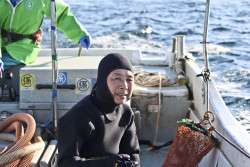
Originally published on metropolis.co.jp on December 2011

We’re #1!
- Residents of Ishigaki Island in Okinawa Prefecture cooked the world’s longest beef kebab. The monster skewer measured 107.6 meters in length.
- A 29-year-old Osaka restaurant manager became the first person to be fined under a law prohibiting the operation of brakeless racing bicycles on public roads.
- Two cosmetics companies in Osaka and Fukuoka have agreed to recall 1.2 million products that they imported in violation of the Pharmaceutical Affairs Act. It’s the largest recall ever in Japan.
- Researchers in Japan and the US have developed a substance “that can be sprayed to make cancer cells glow within minutes and become visible to the naked eye.” The chemical could help surgeons locate cancerous tissue.
- Scientists at Kyoto University have determined that the puzzling phenomenon known as space tornadoes is “likely the result of high-energy gas shooting out of a rotating black hole.” Alrighty then…
Money money money
- The environment ministry says that ¥11.5 billion worth of “eco points” from the government’s recent energy-saving promotion are set to expire next March without being redeemed.
- Authorities are investigating the president of a used-car company over suspicions that he bilked 2,500 investors out of ¥1.3 billion “on the pretext of helping victims of the Great East Japan Earthquake and poverty-stricken African people.”
- Police in Okayama and Yokohama busted three Chinese man and one woman for smuggling 3kg of stimulants into Japan aboard a cargo ship last month. The drugs have a street value of ¥230 million.
- It was announced that Japan will provide $2.9 million of additional funding to support the UN-backed trial of former Khmer Rouge leaders in Cambodia. By the end of the year, the tribunal will have spent nearly $150 million.
- Sentence of the Week: “A ‘veteran’ pickpocket has told police he’s lost his touch and he’s going straight after he was caught lifting a person’s wallet on a bus [in Fukuoka] by another passenger.” (via The Mainichi Daily News)
In hot water
- The owner of an onsen in Ibaraki is suing Tokyo Electric Power Company for ¥47 million over lost business due to the accident at the Fukushima nuclear plant. TEPCO, for its part, contends that customers are staying away from the hot spring because of quake damage, not radiation fears.
- Meanwhile, a man in his 60s died of Legionnaire’s disease that he contracted after bathing at an onsen in Gunma.
- The Imperial Household Agency told the government it wants to discuss certain protocol regulations that it finds “concerning,” including the stipulation that female members of the Imperial family must leave the household after marrying a commoner.
- A Narita Airport cop was busted for using his infirmed grandfather’s ETC card to get discounted toll fares.
- Police say a small car “smashed through the boom barrier” at a railway crossing in Kurume, Fukuoka, before being hit by an express train. Both people in the vehicle were killed, but no one on the train was injured.
- Headline of the Week: “Drunk Policeman Arrested after Staggering into Wrong Home” (via The Mainichi Daily News)
Gulp!
- Scientists at the University of Tokyo have found that the frequency of earthquakes near many of Japan’s most active faults has increased 10-fold since March 11.
- Meanwhile, the government’s Earthquake Research Committee has concluded that “multiple-quake events with subsequent large-scale tsunami” have occurred five times since the 4th century BCE—not once every 1,000 years, as previously thought.
- Perhaps in response, the TMG is set to issue an ordinance calling for companies to stockpile three days’ worth of emergency supplies for each employee.
- The Cabinet Office estimates that 3.52 million Tokyoites were unable to return to their homes following the March 11 quake.
Rocky relations
- A former civilian employee of the US Navy was ordered by a court in Kanagawa to pay ¥13.7 million in damages to the family of a 70-year-old Japanese man he pushed to the ground outside a bar near Yokosuka base in 2006. The man later died of brain damage.
- Meanwhile, prosecutors in Okinawa indicted another US military employee for a car accident that killed a 19-year-old Japanese woman in January.
- Among the new construction projects being undertaken by the South Korean government near the disputed Takeshima islets are “a breakwater, an underwater park and an underwater observatory.”
- The Chinese government lifted its import ban on non-perishable food items from Japan, although fruits, vegetables and dairy products are still verboten due to radiation fears.
- Meanwhile, the EU decided to extend its restrictions on Japanese imports until next March, but the UK okayed the sale of Wagyu beef.
Creature comforts
- The mayor of Naie, Hokkaido, presented a gold medal to a Labrador retriever that kept its 81-year-old owner and her three-year-old granddaughter warm during a freezing night following a car crash last month.
- Perhaps overstating things, the mayor said the dog has “taught me the importance of supporting each other.”
- Scientists at the delightfully named Research Institute for Sustainable Humanosphere in Kyoto have discovered a method for making crab shells transparent. It’s thought that the discovery will help in the manufacture of solar panels and flexible video screens.
- A 1.2m-long wild boar entered a private residence in Tochigi and began eating garbage before being surprised by the homeowner and injuring both the man’s legs.
- Bottom Story of the Week: “Popular Novelist’s Book Makes Jump from Paperback to Hardcover” (via The Daily Yomiuri)
Compiled from reports by AP, Japan Today, The Japan Times, The International Herald Tribune, The Asahi Shimbun, The Mainichi Daily News, Daily Yomiuri, AFP, Reuters and Kyodo







